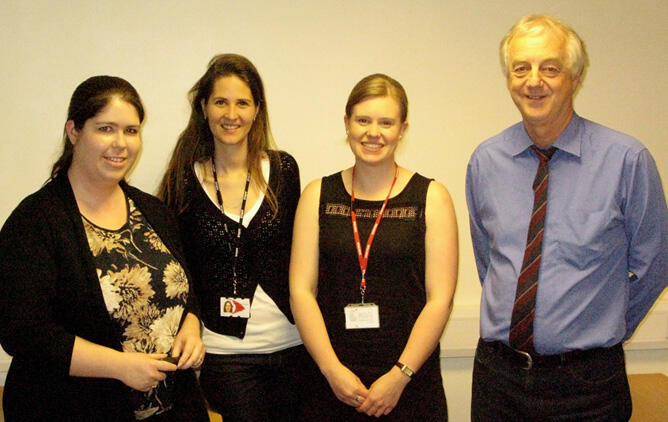
The Maths/Stats Forum at LSTM is a monthly meeting of staff and postgraduate students involved in research activities with a mathematical, modelling and/or statistical content. The meetings generally consist of a short presentation by a Forum member of the work they are engaged in within LSTM, followed either by a talk from an internal or external speaker or by an open discussion of a technical issue suggested by a Forum member.
Today’s meeting featured an introductory presentation by LSTM Research Assistants Katherine Kay and Eva Maria Stahli-Hodel (far left and second from left), entitled: An Introduction to pharmacokinetic-pharmacodynamic (PK/PD) Modelling. Providing a platform for a second presentation from Lancaster University PhD student Alice Parry (2ndfrom right), who is based at the University’s Medical and Pharmaceutical Statistics Research Unit. Alice has been analysing antimalarial drug trials, which are necessary to test the effectiveness and safety of drugs used to treat malaria. This new generation of antimalarial drugs (ACTs) are being deployed to replace older, ineffective drugs.
In such trials, the parasite count is determined by taking blood samples pre-treatment and on several predefined follow-up days. However, at present there exist a wide variety of different methods to analyse the results of malaria trials on a per-human basis and no agreement exists which method is preferable despite strong recommendations by WHO.
Also, a person may have several malaria infections (clones) present at the time of treatment and still be liable to be bitten and re-infected. For this reason, special attention is given to classifying the clone outcomes as cured, infections which never fully clear, new or ambiguous based on 3 genetic markers. The method used to incorporate new infections, once classified, is still an area for discussion. Some believe they should be removed from the analysis where as others, including Ms Parry, think they should be included as successes, failures or censored.
Ms. Parry is evaluating existing methods for analysing Malaria trial data and to improve on existing methods in the light of high drop-out rates, imprecision in detecting infections and uncertainty in genotyping. The developed approaches are being evaluated on simulated and real trial data. These findings will inform about how best to optimise drug deployment policies that produce robust, effective and sustainable drug dosing regimens.
The development of good drug treatment simulation models running in parallel with clinical and field data collection is an essential methodological requirement that should be addressed as a matter of urgency.
Anyone interested in the work of the Maths and Stats Group can contact coordinator Dr Brian Faragher (pictured far right).